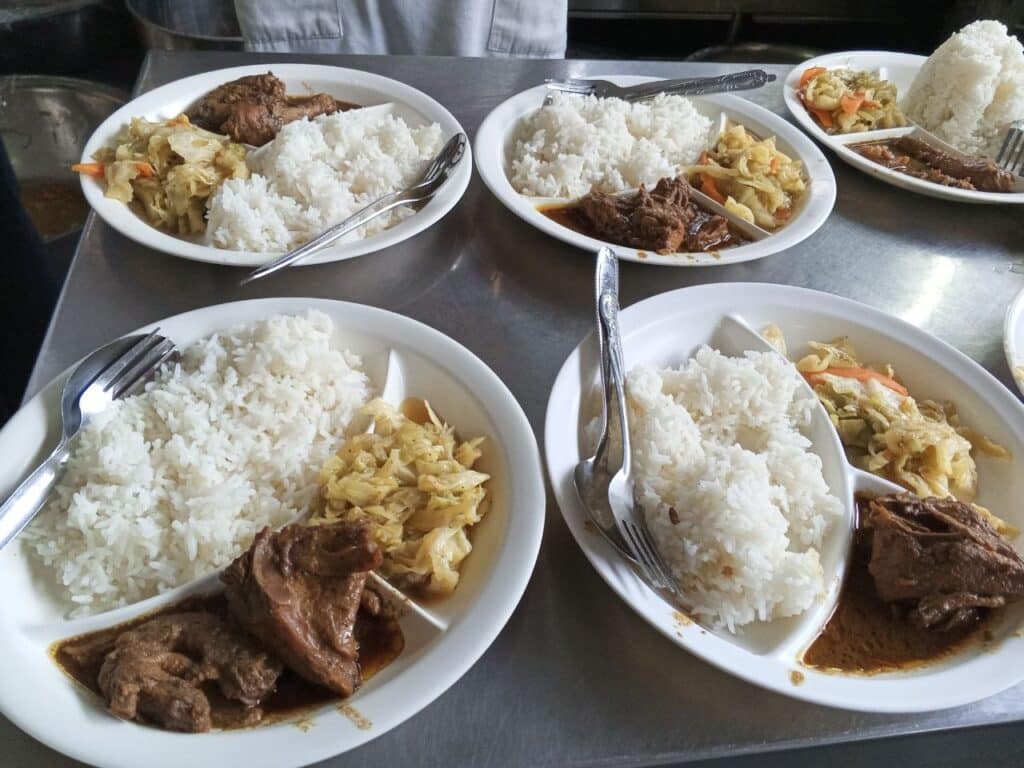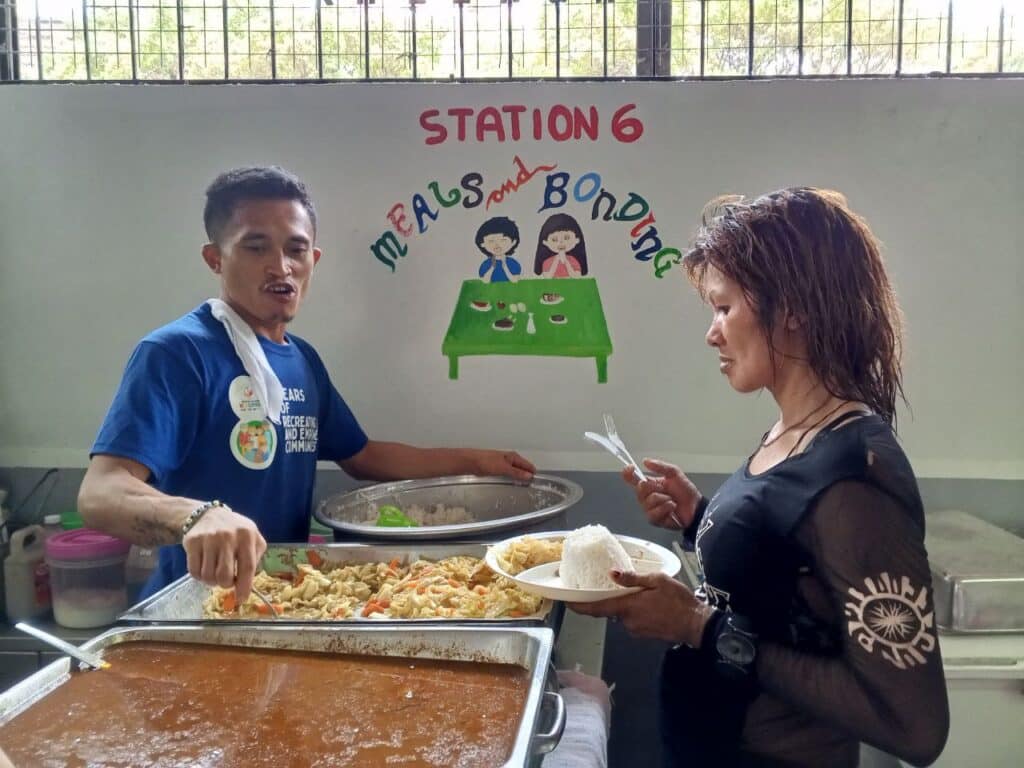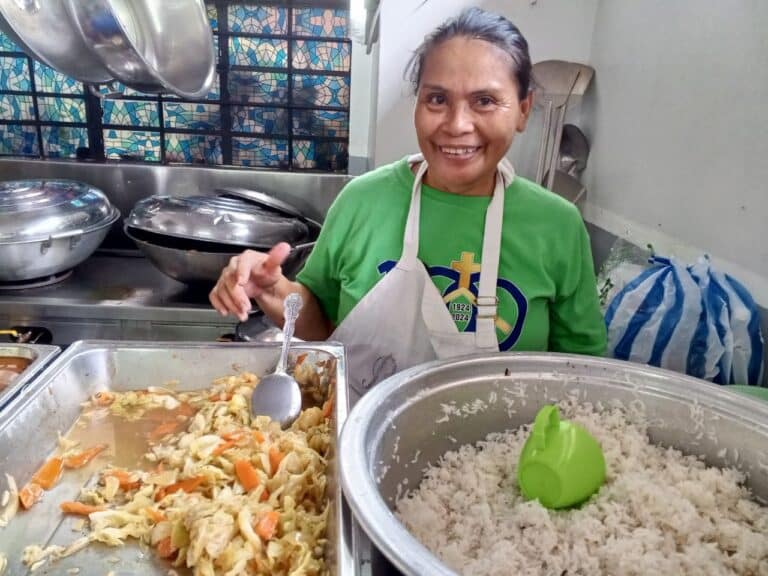By Ludy Duran
“Dasal-Aral-Gawa”. This is the framework guiding Arnold Janssen Kalinga Center’s the resident volunteers’ 6-month formation program. Simple yet powerful, it even echoes the rule of life of the early monastic orders. While forming the soul, the program also aims to upskill the resident volunteers, who have chosen to leave their life on the streets and start a new chapter in their lives by undergoing formation at the Center.
As part of our dedication to serving the homeless better, Kitchen Management 101 is part of their training to become healthy, reliable, and productive members of society. This training module hopes to equip volunteers with the essential skills and knowledge needed to effectively run the ever-busy and sometimes unpredictable AJ Kalinga kitchen, which serves an average of a thousand street dwellers a week.
From food safety to staff management
“Maraming nagbago [because of the kitchen management training]. Natuto silang kumilos na hindi na kailangan utusan, (A lot of things changed because of the kitchen management training. They learned to work without being told),” shared Christian Punzalan, one of the Batch 9 resident volunteers who have undergone 4 sessions on cooking and food preparation basics as part of the kitchen management module.
According to Punzalan, he finds the session on the proper measurement of ingredients particularly valuable. “’Yung mahalaga talaga ‘yung sa panimpla, tatakalin, para maayos mo ‘yung lasa. ‘Yung pagluluto kasi diyan mano-mano, tulad ng ginagawa namin, tantsayahan. (What’s really important is the measurements so that you can calibrate how it tastes. Because we just usually do things by hand, we just estimate when cooking),” he explained.

Kitchen Management 101 focuses on instilling key principles and practices that are integral to the efficient and successful operation of a kitchen. Ten resident volunteers are currently undergoing training comprising a wide range of topics, including menu planning; inventory control; staff management; food safety; and equipment maintenance. By familiarizing themselves with these different aspects, the volunteers have a better understanding of what successful kitchen management looks like.
Delicious & nutritious meals
One important topic in the training is menu planning, where volunteers learn how to create balanced and diverse menus that cater to the nutritional needs of our dear street dwellers. By planning the meals, volunteers can ensure that meals are not only delicious and satisfying but also nutritious.
Inventory control is another crucial component of the program. Volunteers learn why it’s important to maintain inventory records, to set quality levels for ingredients and supplies, and to effectively manage stocks to avoid shortages or wastage.

Of course, a kitchen isn’t a kitchen without warm bodies. This is why staff management is also emphasized in the training. Volunteers are taught how to foster a positive and productive work environment; effective communication; and task delegation. Teamwork is also highlighted as a key element in smooth and efficient kitchen operations.
Moreover, food safety and hygiene protocols are covered in the training. Volunteers are trained on proper food handling practices, sanitation procedures, and compliance with food safety regulations to maintain a safe and hygienic kitchen environment.
Empowered in the kitchen
Volunteers are also trained on equipment maintenance practices to ensure that kitchen appliances are properly cared for and in optimal working condition. By understanding the importance of regular maintenance and cleaning schedules, volunteers can prolong the lifespan of kitchen equipment and prevent unexpected breakdowns.
In any setting, skill isn’t everything. Attitude and values tie everything together. The integration of values formation, team building, and the development of Christian values in work and labor enriches the training experience for our volunteers. A values-driven orientation equips them with the moral compass and necessary interpersonal skills to put their technical know-how to good use. Nurturing a culture of respect, collaboration, and service rooted in strong ethical and Christian values not only enhances the quality of our kitchen management but also fosters a supportive and nurturing environment where volunteers can become their best selves.
In any setting, skill isn’t everything. Attitude and values tie everything together.
Another AJ Kalinga first, Kitchen Management 101 is an essential component of our volunteer training program, designed to empower resident volunteers in the kitchen. By equipping volunteers with the tools to effectively work in a busy kitchen, we uphold our commitment to serve hearty, home-cooked meals to our dear homeless—with lots of heart!

